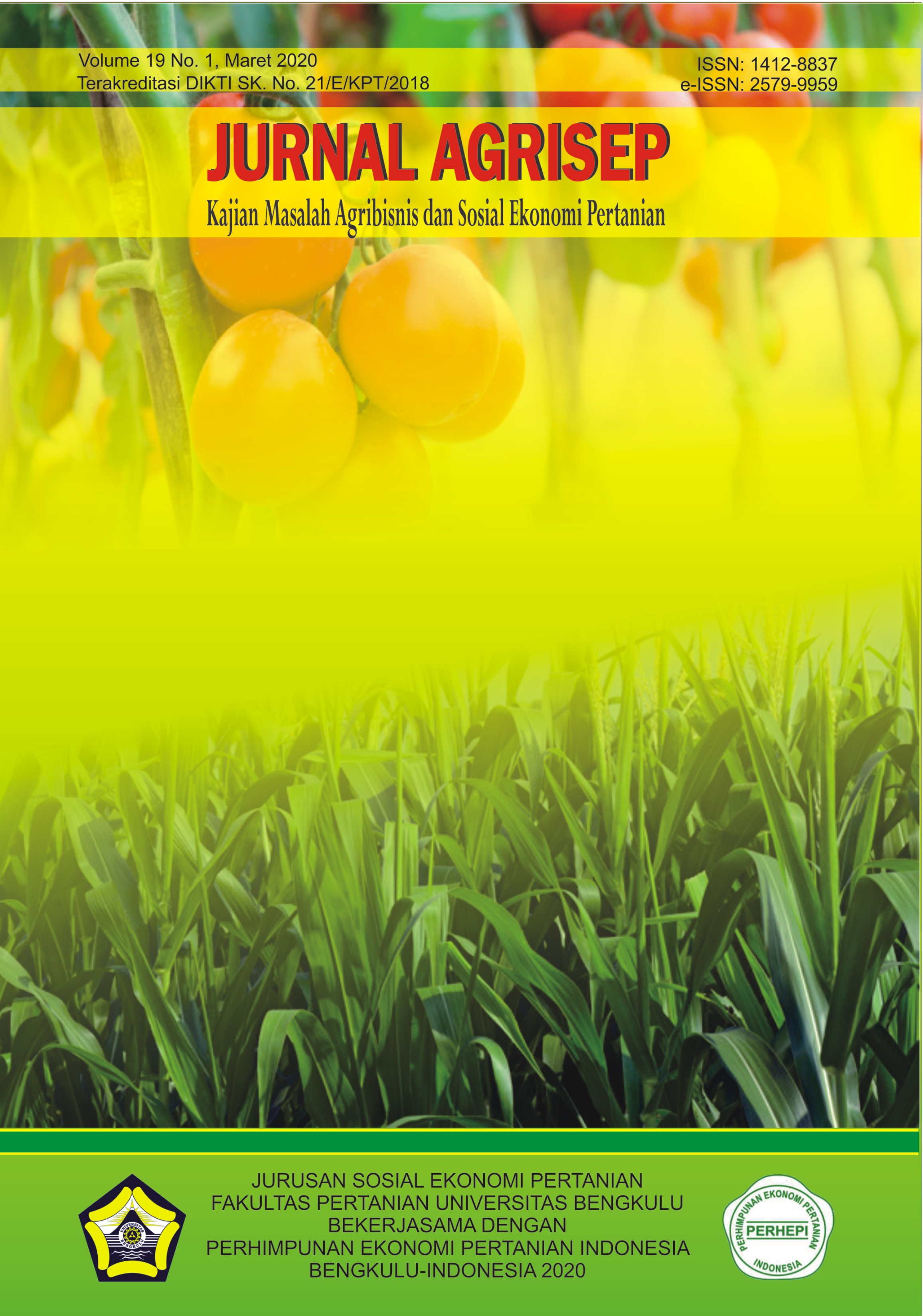Main Article Content
Abstract
Coffee is a superior commodity that has a big role in the Indonesian economy. Temanggung Regency is one of the regions in Central Java that has a high coffee production and broad market share, especially for Robusta coffee. The quality of coffee is determined by geographical factors, the process of cultivation and post harvest processing. Geographical indications are expected to create the unique character of Temanggung robusta coffee. Geographical Indication Standards for Temanggung Robusta Coffee have been prepared. This study aims to identify the level of adoption of Temanggung Robusta coffee IG standards, identify farmers' perceptions of the benefits and constraints in the adoption of Temanggung Robusta coffee IG standards. The research method used descriptive method. Data was collected using a survey with a number of respondents 220 farmers spread across 11 subdistricts Robusta coffee centers. The data analysis method used the scoring method. The results showed that overall the level of adoption of IG standards by coffee farmers was still at the interested stage, although for some standards it had already reached the evaluation, tried and even adoption stages. Farmers have a very high perception of the benefits of adopting IG standards. But, on the other hand farmers still feel constrained in adopting IG standards because farmers are still constrained by high costs, greater labor and time and no price guarantees for coffee produced according to IG standards Collaboration with the government, the private sector, universities and MPIG is needed to provide education, facilitation and assistance in the process of adopting IG standards in order to produce good quality, unique coffee and high competitiveness
Keywords
Article Details
Copyright (c) 2020 Nuning Setyowati Sumarjo, Hanifah Ihsaniyati Ihsaniyati, Pardono Pardono Pardono

This work is licensed under a Creative Commons Attribution-ShareAlike 4.0 International License.
Authors who publish with this journal agree with the following terms:
- Authors retain copyright and grant the journal right of first publication with the work simultaneously licensed under a Creative Commons Attribution-ShareAlike 4.0 International License that allows others to share the work with an acknowledgment of the work's authorship and initial publication in this journal.
- Authors are able to enter into separate, additional contractual arrangements for the non-exclusive distribution of the journal's published version of the work (e.g., post it to an institutional repository or publish it in a book), with an acknowledgment of its initial publication in this journal.
- Authors are permitted and encouraged to post their work online (e.g., in institutional repositories or on their website) prior to and during the submission process, as it can lead to productive exchanges, as well as earlier and greater citation of published work (See The Effect of Open Access).
- This work is licensed under a Creative Commons Attribution-ShareAlike 4.0 International License.
References
- Ellyanti, Karim, A., dan Basri, H. 2012. Analisis Indikasi Geografis Kopi Arabika Gayo Ditinjaudari Rencana Tata Ruang Wilayah Kabupaten. Jurnal Agrista. 16(2): 46-61.
- Kiptot, E., Lukuyu, B., Franzel, S., dan Place, F., 2011. The farmer trainers approach in technology dissemination in Kenya: farmer trainers and trainees perspectives, East Africa Dairy Development Project. Working Paper, Nairobi, Kenya.
- Kumar, K.K.V., Praveen, dan Dharam, R.S. 2015. Economic Benefit of Organic Farming in India. Economic Affair. 60(3): 569-576.
- Maredia, M. K., dan Minde, I. J. 2002. Technology profitability and agricultural transformation: Concepts, evidence, and policy implications. Perspectives on agricultural transformation: A view from Africa. 83-116.
- Masyarakat Perlindungan Indikasi Geografis (MPIG) Kopi Robusta Temanggung. 2015. Buku Persyaratan Permohonan Pendaftaran Perlindungan Indikasi Geografis Kopi Robusta Temanggung.
- Mutoko, M.C., Hein, L., dan Shisanya, C.A. 2014. Farm diversity, resource use efficiency and sustainable land management in the western highlands of Kenya. Journal of Rural Studies. 36(1): 108-120.
- Odongo, O.M. 2010. Need for effective collaboration and its challenges: Kenya Agricultural Research Institute's partnerships and collaborative efforts in agricultural research and development, KARI Mini- Scientific Conference, Nairobi, Kenya.
- Riduwan dan Akdon. 2013. Teknik Penulisan Ilmiah, Teknik Penulisan Tesis, Karya Ilmiah. Bandung : Alfabeta.
- Sugiyono. 2014. Metode Penelitian Pendidikan (Pendekatan Kuantitatif, Kualitatif, dan R&D). Bandung : Alfabeta
- Yulistriani, Yaherwandi dan Paloma, C. 2019. Roadmap pengembangan Kopi di Kabupaten Solok Selatan. AGRISEP.18(2): 279 – 288.
References
Ellyanti, Karim, A., dan Basri, H. 2012. Analisis Indikasi Geografis Kopi Arabika Gayo Ditinjaudari Rencana Tata Ruang Wilayah Kabupaten. Jurnal Agrista. 16(2): 46-61.
Kiptot, E., Lukuyu, B., Franzel, S., dan Place, F., 2011. The farmer trainers approach in technology dissemination in Kenya: farmer trainers and trainees perspectives, East Africa Dairy Development Project. Working Paper, Nairobi, Kenya.
Kumar, K.K.V., Praveen, dan Dharam, R.S. 2015. Economic Benefit of Organic Farming in India. Economic Affair. 60(3): 569-576.
Maredia, M. K., dan Minde, I. J. 2002. Technology profitability and agricultural transformation: Concepts, evidence, and policy implications. Perspectives on agricultural transformation: A view from Africa. 83-116.
Masyarakat Perlindungan Indikasi Geografis (MPIG) Kopi Robusta Temanggung. 2015. Buku Persyaratan Permohonan Pendaftaran Perlindungan Indikasi Geografis Kopi Robusta Temanggung.
Mutoko, M.C., Hein, L., dan Shisanya, C.A. 2014. Farm diversity, resource use efficiency and sustainable land management in the western highlands of Kenya. Journal of Rural Studies. 36(1): 108-120.
Odongo, O.M. 2010. Need for effective collaboration and its challenges: Kenya Agricultural Research Institute's partnerships and collaborative efforts in agricultural research and development, KARI Mini- Scientific Conference, Nairobi, Kenya.
Riduwan dan Akdon. 2013. Teknik Penulisan Ilmiah, Teknik Penulisan Tesis, Karya Ilmiah. Bandung : Alfabeta.
Sugiyono. 2014. Metode Penelitian Pendidikan (Pendekatan Kuantitatif, Kualitatif, dan R&D). Bandung : Alfabeta
Yulistriani, Yaherwandi dan Paloma, C. 2019. Roadmap pengembangan Kopi di Kabupaten Solok Selatan. AGRISEP.18(2): 279 – 288.
